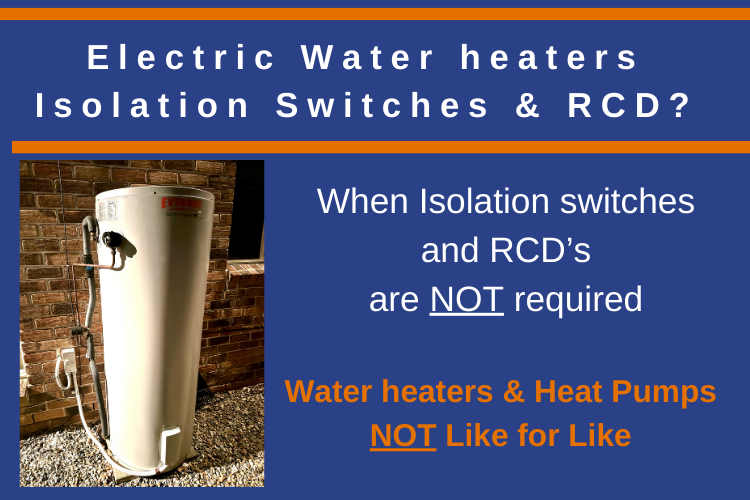
When Do Electric Water Heaters/Hot Water Units Require a Lockable Isolation Switch and RCD?
New definition, Heat Pumps not Like for Like with water Heaters!
In 2018, the AS/NZS 3000:2018 Electrical Installation “wiring rules” introduced new requirements in Clause 4.8.2.3. For all new installations, an independent, lockable isolation switch must be installed for fixed wired water heaters, which must also be protected by a Residual Current Device (RCD).
Requirements for New Installations:
- New water heater installations.
- Installed adjacent to (but not on) the water heater.
- All power must be isolated from the water heater with a single switch.
- Applies to heat pump water heater circuits that are fixed wiring.
Requirements for Existing Installations:
- Applies to situations that are not like-for-like replacements, which are considered installation work.
- Example: Replacing a 2.4 kW electric water heater with a 2.4 kW heat pump.
- Why? Heat pumps and electric water heaters function differently. A heat pump uses a compressor system, while an electric heater uses an element, making them “not like-for-like.”
- Example: Replacing a 2.4 kW electric water heater with a 2.4 kW heat pump.
Other cases:
- Any upgrades, alterations, or extensions to a circuit or cable (e.g., changing the wiring, relocating the heater, or upgrading to a larger unit).
Exemptions for Existing Installations:
- Like-for-like replacements do not require an isolation switch or RCD.
- Example: Replacing a 2.4 kW, 240-litre water heater with a similar 2.4 kW model.
- Electrical installation work does not include replacing similar appliances when:
- Voltage, current, and power ratings are the same or lower.
- The appliance performs the same function in the same way.
- Electrical characteristics (e.g., insulation, earthing) match or exceed the original.
Summary:
- Isolation switch and RCD are required for:
- New installations or wiring replacements.
- Alterations, extensions, or upgrades (e.g., switching from an electric water heater to a heat pump).
- No isolation switch or RCD is required for:
- Like-for-like replacements with no wiring changes.
- Restricted licence holders can complete like-for-like replacements, but any circuit upgrades should involve a full electrician.
Best practices suggest upgrading to an RCD-protected circuit and adding an isolation switch to improve safety, even for like-for-like replacements.
Like to know more about our restricted electrical licence courses phone 1300 588749 or for Restricted Electrical Licence courses in Queensland more information
and for the ESV ( Victoria) Restricted Electrical Licence courses more info here
Restricted Electrical Licence Course Overview
The Restricted Electrical Licence Course is designed for non-electrical trades that need to perform incidental electrical work related to their job.
Course Eligibility:
You can apply for this course if you meet one of the following criteria:
- You hold a current Restricted Electrical Permit from the Queensland Electrical Safety Office and have a relevant trade or qualification (Certificate III level), or
Additionally, there must be a need for you to perform incidental electrical work as part of your job, as outlined in the eligibility scope.
Application Process:
- You must have a copy of your Restricted Electrical Permit before starting the course.
- Follow the application form carefully and verify your eligibility through the Electrical Safety Office.
Course Details for Plumbers (Hot Water Systems 250/415VAC):
- Training Permit: Required before training
- Employer Support Letter: Not required
- Licence Outcome: Limited to water heaters up to 250VAC
- Logbooks: 3 logbooks required
- Course Delivery: Online + 5 days face-to-face practical
Course Units:
- UEECD0007 – Apply OHS/WHS
- UEERL0003 – Conduct In-Service Testing (Test & Tag)
- UEERL0004 – Disconnect & Reconnect
- UEERL0005 – Locate and Rectify Faults
- UEERL0001 – Plugs & Cords 230VAC
- Restricted Electrical Licence courses in Queensland more information and for the ESV ( Victoria) Restricted Electrical Licence courses more info here






One Comment
This is a very good article. By protecting against fire and electrocution, RCDs prevent earth fault induced electrocution. When you cut through a cable while mowing the lawn and accidentally touch the live wires or when a faulty appliance overheats and leaks electricity.
Comments are closed.